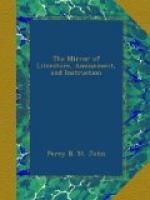[1] From the Literary Gazette.
See Notice of the Comic
Annual—Mirror,
No. 467.
* * * * *
SOME PASSAGES FROM THE DIARY OF THE LATE MR. ST. JOHN LONG.
“Aye—there’s the rub.”—HAMLET.
“’Tis all one!” said I, laying down the newspaper on the breakfast table, after reading an erroneous representation of myself and the Marquess of Sligo:—“I am resolved to remove this stain from my character, and, if hard-rubbing can do it, I may hope to succeed.” I had scarcely pronounced these words, when my servant entered the room to inform me that a person had arrived in breathless haste, imploring my assistance for a gentleman in a dying condition. Heedful, as I ever am to attend to the sufferings of others—a pursuit in which I have found ample fee-licity—I drew on my boots and followed the applicant to the house of the suffering gentleman. This was situated in a picturesque part of the metropolis, and, on knocking, the door was opened to me by a man who might be six and forty years of age—there, or thereabout. Guessing the purport of my visit, he said nothing, but led me up to his master’s room, when a spectacle of the most appalling character met my eyes. A gentleman in the prime of life, lay extended on a bed—his hair dishevelled, his dress disordered, and his complexion a midway hue between the tints of chalk and Cheshire cheese. His tongue hung out of his mouth, loaded with evidence of internal strife. I naturally believed that the present was a confirmed case of phthisis pulmonalis, and I accordingly had recourse to my well known, and, with-few-exceptions-always-successful remedy of inhaling. In this instance, however, it did not answer my expectations. Instead of benefitting the trachea, it produced a sympathetic affection of the stomach and diaphragm,




